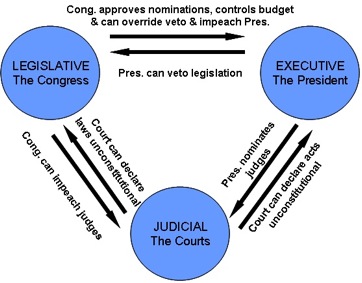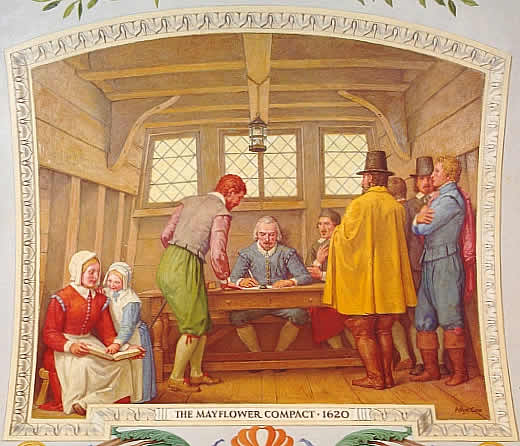|
|
Online Texts for Craig White's Literature Courses
|
|
|
Utopian selections
from "Founding Texts" of European America |
The Pilgrims prepare the Mayflower Compact (1620) |
from Chapter 1. Bradford’s history of the Protestant Reformation in England
[chapter 1, paragraph 1 > ¶1.1] It is well known unto the godly and judicious, how, ever since the first breaking out of the light of the gospel [Protestant Reformation] in our Honorable Nation of England, (which was the first of nations whom the Lord adorned therewith, after that gross darkness of popery [Catholicism] which had covered and overspread the Christian world,) what wars and oppositions ever since, Satan hath raised, maintained, and continued against the Saints, from time to time, in one sort or other. Sometimes by bloody death and cruel torments; other [times Satan inflicted] imprisonments, banishments, and other hard usages; as being loath his [Satan’s] kingdom should go down, the truth prevail, and the churches of God revert to their ancient purity, and recover their primitive order, liberty, and beauty. [Protestantism recovers the original idea of the church like Christ’s Apostles practiced in the Book of Acts 2:42-45; by implicit contrast, the Catholicism adds to the history of the church--which, according to the Protestants, would lead them away from the light of divine revelation in the gospel and into the darkness of human sin.]
![]()
from The Mayflower Compact (1619) (From William Bradford, Of Plymouth Plantation; the Mayflower Compact was composed by "the Pilgrims" before their landing in North America in 1619)
We whose names are underwritten, the loyal subjects of our dread Sovereign Lord King James, by the Grace of God of Great Britain, France, and Ireland Kind, Defender of the Faith, etc.
Having undertaken, for the Glory of God and advancement of the Christian Faith and Honor of our King and Country, a Voyage to plant the First Colony in the Northern Parts of Virginia, do by these presents solemnly and mutually in the presence of God and one of another, Covenant and Combine ourselves together into a Civil Body Politic, for our better ordering and preservation and furtherance of the ends aforesaid; and by virtue hereof to enact, constitute and frame such just and equal Laws, Ordinances, Acts, Constitutions and Offices, from time to time, as shall be thought most meet and convenient for the general good of the Colony, unto which we promise all due submission and obedience. . . .
![]()
from William Bradford, Of Plymouth Plantation (1623)
. . . All this while no supply was heard of, neither knew they when they might expect any. So they began to think how they might raise as much corn as they could, and obtain a better crop than they had done, that they might not still thus languish in misery. At length, after much debate of things, the Governor (with the advice of the chiefest amongst them) gave way that they should set corn every man for his own particular, and in that regard trust to themselves; in all other thing to go on in the general way as before. And so assigned to every family a parcel of land, according to the proportion of their number, for that end, only for present use (but made no division for inheritance) and ranged all boys and youth under some family. This had very good success, for it made all hands very industrious, so as much more corn was planted than otherwise would have been by any means the Governor or any other could use, and saved him a great deal of trouble, and gave far better content. The women now went willingly into the field, and took their little ones with them to set corn; which before would allege weakness and inability; whom to have compelled would have been thought great tyranny and oppression.
The experience that was had in this common course and condition, tried sundry years and that amongst godly and sober men, may well evince the vanity of that conceit of Plato's and other ancients applauded by some of later times; and that the taking away of property and bringing in community into a commonwealth would make them happy and flourishing; as if they were wiser than God. For this community (so far as it was) was found to breed much confusion and discontent and retard much employment that would have been to their benefit and comfort. For the young men, that were most able and fit for labor and service, did repine that they should spend their time and strength to work for other men's wives and children without any recompense. The strong, or man of parts, had no more in division of victuals and clothes than he that was weak and not able to do a quarter the other could; this was thought injustice. The aged and graver men to be ranked and equalized in labors and victuals, clothes etc., with the meaner and younger sort, thought it some indignity and disrespect unto them. And for men's wives to be commanded to do service for other men, as dressing their meat, washing their clothes, etc., they deemed it a kind of slavery, neither could many husbands well brook it. Upon the point all being to have alike, and all to do alike, they thought themselves in the like condition, and one as good as another; and so, if it did not cut off those relations that God hath set amongst men, yet it did at least much diminish and take off the mutual respects that should be preserved amongst them. And would have been worse if they had been men of another condition. Let none object this is men's corruption, and nothing to the course itself. I answer, seeing all men have this corruption in them, God in His wisdom saw another course fitter for them.
![]()
A Description of “The First Thanksgiving”
From Edward Winslow's letter of 11 Dec. 1621 to a friend in England; in Dwight B. Heath, ed., A Journal of the Pilgrims at Plymouth (Mourt's Relation) (New York: Corinth Books, 1963)
82 Our harvest being gotten in, our governor sent four men on fowling, that so we might after a special manner rejoice together after we had gathered the fruit of our labours. They four in one day killed as much fowl as, with a little help beside, served the company almost a week. At which time, amongst other recreations, we exercised our arms, many of the Indians coming amongst us, and among the rest their greatest king Massasoit, with some ninety men, whom for three days we entertained and feasted, and they went out and killed five deer, which they brought to the plantation and bestowed on our governor, and upon the captain and others. And although is be not always so plentiful as it was at this time with us, yet by the goodness of God, we are so far from want that we often wish you partakers of our plenty.
![]()
Bradford's description of "The First Thanksgiving"
(Wm. Bradford, Of Plymouth Plantation, 1620-1647. NY: Random House, 1981, p. 100.)
They [the Pilgrim settlers] began now to gather in the small harvest they had, and to fit up their houses and dwellings against winter, being all well recovered in health and strength and had all things in good plenty. For as some were thus employed in affairs abroad, others were exercised in fishing, about cod and bass and other fish, of which they took good store, of which every family had their portion. All the summer there was no want; and now began to come in store of fowl, as winter approached, of which this place did abound when they came first (but afterward decreased by degrees). And besides waterfowl there was great store of wild turkeys, of which they took many, besides venison, etc. Besides they had about a peck a meal a week to a person, or now since harvest, Indian corn to that proportion. Which made many afterwards write so largely of their plenty here to their friends in England, which were not feigned but true reports.
Popular art of the "First Thanksgiving"
Question: How does "the first Thanksgiving" serve as a utopian vision for early and later North America / USA?
Objective 3f. Are utopias limited to Western Civilization, rationalism, and social engineering, or may they exemplify multiculturalism?
Other utopian features: abundance, labor off-stage or unrepresented; utopian features may often be attributed to the small founding of a larger nation.
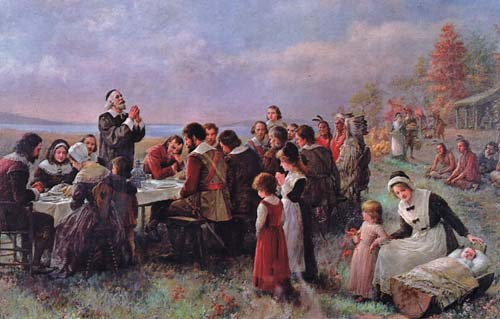 |
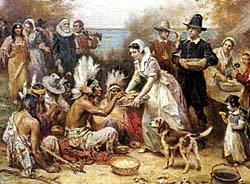 |
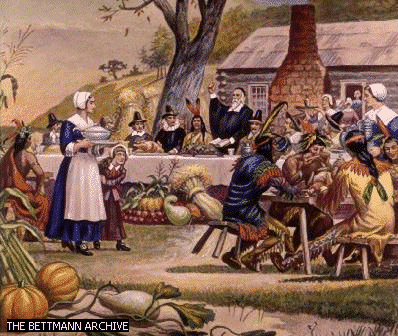 |
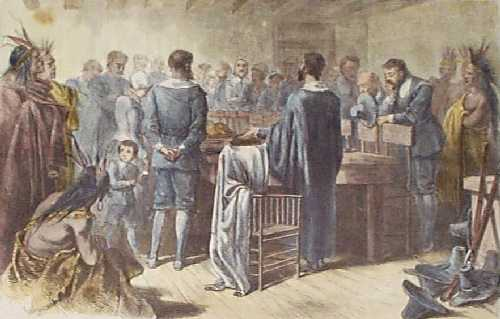 |
![]()
| John Winthrop "A Model of Christian Charity" 1630 (sermon preached aboard the ship Arbella in Puritan migration from England to Massachusetts Bay) |
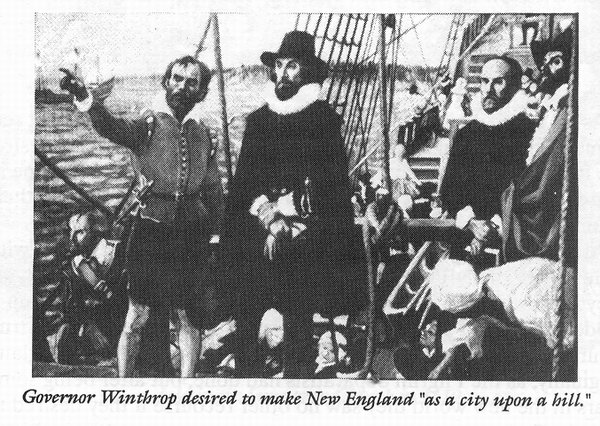 |
. . . that every man might have need of other, and from hence they might be all knit more nearly together in the bonds of brotherly affection. . . .
. . . There are two rules whereby we are to walk one towards another: Justice and Mercy. These are always distinguished in their act and in their object, yet may they both concur in the same subject in each respect; as sometimes there may be an occasion of showing mercy to a rich man in some sudden danger or distress, and also doing of mere justice to a poor man in regard of some particular contract, etc. . . .
. . . Quest. What rule must we observe and walk by in cause of community of peril?
Ans. The same as before, but with more enlargement towards others and less respect towards ourselves and our own right. Hence it was that in the primitive church* they sold all, had all things in common, neither did any man say that which he possessed was his own. . . . (*Acts 2.42-45)
We must entertain each other in brotherly affection, we must be willing to abridge ourselves of our superfluities, for the supply of other's necessities.
From hence we may frame these conclusions:
First of all, true Christians are of one body in Christ (1 Cor. 12). Ye are the body of Christ and members of their part. All the parts of this body being thus united are made so contiguous in a special relation as they must needs partake of each other's strength and infirmity; joy and sorrow, weal and woe. If one member suffers, all suffer with it, if one be in honor, all rejoice with it.
Secondly, the ligaments of this body which knit together are love.
Thirdly, no body can be perfect which wants its proper ligament.
Fourthly, All the parts of this body being thus united are made so contiguous in a special relation as they must needs partake of each other’s strength and infirmity, joy and sorrow, weal and woe. (1 Cor. 12:26) If one member suffers, all suffer with it; if one be in honor, all rejoice with it.
Fifthly, this sensitivity and sympathy of each other's conditions will necessarily infuse into each part a native desire and endeavor, to strengthen, defend, preserve and comfort the other. To insist a little on this conclusion being the product of all the former, the truth hereof will appear both by precept and pattern. 1 John 3:16, "We ought to lay down our lives for the brethren." Gal. 6:2, "Bear ye one another's burden’s and so fulfill the law of Christ." . . .
. . . So a mother loves her child, because she thoroughly conceives a resemblance of herself in it. Thus it is between the members of Christ; each discerns, by the work of the Spirit, his own Image and resemblance in another, and therefore cannot but love him as he loves himself. . . .
. . . Thus stands the cause between God and us. We are entered into covenant with Him for this work. . . . Now if the Lord shall please to hear us, and bring us in peace to the place we desire, then hath He ratified this covenant and sealed our commission, and will expect a strict performance of the articles contained in it; but if we shall neglect the observation of these articles which are the ends we have propounded, and, dissembling with our God, shall fall to embrace this present world and prosecute our carnal intentions, seeking great things for ourselves and our posterity, the Lord will surely break out in wrath against us, and be revenged of such a people, and make us know the price of the breach of such a covenant.
Now the only way to avoid this shipwreck, and to provide for our posterity, is to follow the counsel of Micah, to do justly, to love mercy, to walk humbly with our God. For this end, we must be knit together, in this work, as one man. We must entertain each other in brotherly affection. We must be willing to abridge ourselves of our superfluities, for the supply of others’ necessities. We must uphold a familiar commerce together in all meekness, gentleness, patience and liberality. We must delight in each other; make others’ conditions our own; rejoice together, mourn together, labor and suffer together, always having before our eyes our commission and community in the work, as members of the same body.
So shall we keep the unity of the spirit in the bond of peace. The Lord will be our God, and delight to dwell among us, as His own people, and will command a blessing upon us in all our ways, so that we shall see much more of His wisdom, power, goodness and truth, than formerly we have been acquainted with. We shall find that the God of Israel is among us, when ten of us shall be able to resist a thousand of our enemies; when He shall make us a praise and glory that men shall say of succeeding plantations, "may the Lord make it like that of New England." For we must consider that we shall be as a city upon a hill. The eyes of all people are upon us. [emulation?] So that if we shall deal falsely with our God in this work we have undertaken, and so cause Him to withdraw His present help from us, we shall be made a story and a by-word through the world. . . .

from The Declaration of Independence (1776)
When in the course of human events, it becomes necessary for one people to dissolve the political bands which have connected them with another, and to assume among the powers of the earth, the separate and equal station to which the laws of Nature and of Nature's God entitle them, a decent respect to the opinions of mankind requires that they should declare the causes which impel them to the separation.
We hold these truths to be self-evident, that all men are created equal, that they are endowed by their Creator with certain unalienable rights, that among these are life, liberty and the pursuit of happiness. That to secure these rights, governments are instituted among men, deriving their just powers from the consent of the governed,--That whenever any form of government becomes destructive of these ends, it is the right of the people to alter or to abolish it, and to institute new government, laying its foundation on such principles and organizing its powers in such form, as to them shall seem most likely to effect their safety and happiness. . . .
[Instructor's note: the Declaration's references to "created equal" and "the pursuit of happiness" may exemplify utopia's balance of "equality and freedom."]
He has endeavoured to prevent the population of these States; for that purpose obstructing the Laws for Naturalization of Foreigners; refusing to pass others to encourage their migrations hither, and raising the conditions of new Appropriations of Lands. ["Naturalization" is the making of immigrants to citizens; e.g., the INS = Immigration and Naturalization Service] . . .
He has erected a multitude of New Offices, and sent hither swarms of Officers to harass our people, and eat out their substance. ["anti-government" spirit of Declaration--"Substance" would be "livelihood" or "property," which bureaucracy may diminish]
He has kept among us, in times of peace, Standing Armies without the consent of our legislatures. [Only in the 20th century did the USA maintain large permanent armed forces]
He has affected to render the Military independent of and superior to the Civil power. . . . [In contrast, the Constitution makes the civilian President of the US "commander in chief" of the armed forces, limiting opportunities for military takeover of government]
For imposing Taxes on us without our Consent: . . .
He has excited domestic insurrections amongst us, and has endeavoured to bring on the inhabitants of our frontiers, the merciless Indian Savages, whose known rule of warfare, is an undistinguished destruction of all ages, sexes and conditions. . . . [Indians as victims of immigration and population growth; Indian warfare depicted as terrorism]
Section of Declaration drafted by Jefferson but omitted from final copy by committee:
He has waged cruel war against human nature itself, violating its most sacred rights of life and liberty in the persons of a distant people who never offended him, captivating and carrying them into slavery in another hemisphere, or to incur miserable death in their transportation hither. This piratical warfare, the opprobrium of infidel powers, is the warfare of the Christian king of Great Britain. (determined to keep open a market where MEN should be bought and sold,) he has prostituted his negative for suppressing every legislative attempt to prohibit or to restrain this execrable commerce (determining to keep open a market where MEN should be bought and sold): and that this assemblage of horrors might want no fact of distinguished die, he is now exciting those very people to rise in arms among us, and to purchase that liberty of which he had deprived them, by murdering the people upon whom he also obtruded them: thus paying off former crimes committed against the liberties of one people, with crimes which he urges them to commit against the lives of another.
Jefferson, Notes on the State of Virginia (1787), on American Indians & population
Art depicting the signing and writing of the Declaration of Independence
Questions: If "all men are created equal," who counts as "all men?" If the inclusiveness of equality continues to expand, may the USA be described as a progressive utopia? What if economic inequality is disregarded?
Recall earlier balance cited between "Liberty" and "Equality" raised by Rand's Anthem.
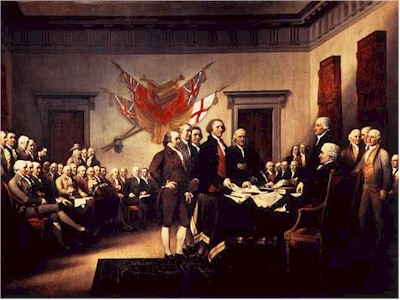 |
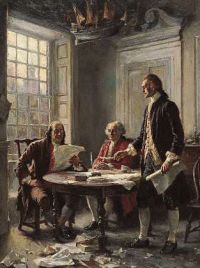 |
Even if the social contract of the Declaration originally excluded all women and all people of color, how may that social contract also be viewed as progressively utopian?
Some combination of idealism and practicality; stable yet progressive, adaptive
In late 1700s "all men" probably indicated "white men with property"--that is, equality limited to particular race, gender, and class
For 200+ years, however, the official or legal limits on equality have expanded to include, in order:
--white men without property (early 1800s)
--citizenship (w/ some rights) for black men (13th, 14th Amendments after Civil War)
--woman's suffrage (1920)
--Civil Rights Bills 1960s, Women's reproductive rights 1970s (v. rights of unborn)
--gay rights
--rights of nature (i.e., animals, trees)
![]()
from Preamble to the Constitution of the United States of America (1789)
We the People of the United States, in order to form a more perfect union, establish justice, insure domestic tranquility, provide for the common defense, promote the general welfare, and secure the blessings of liberty to ourselves and our posterity, do ordain and establish this Constitution for the United States of America.
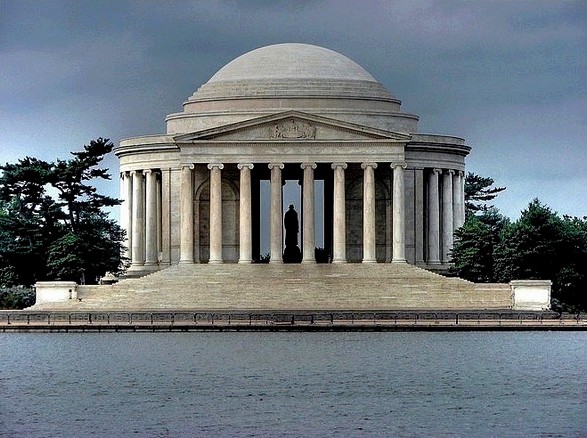
USA's founding & Constitution established during Enlightenment (late 1600s-1700s)
Below: "Orrery" demonstrating clockwork balance of Enlightenment cosmos

American Constitution's "balance of powers" imitates harmony and stability of Enlightenment cosmos
